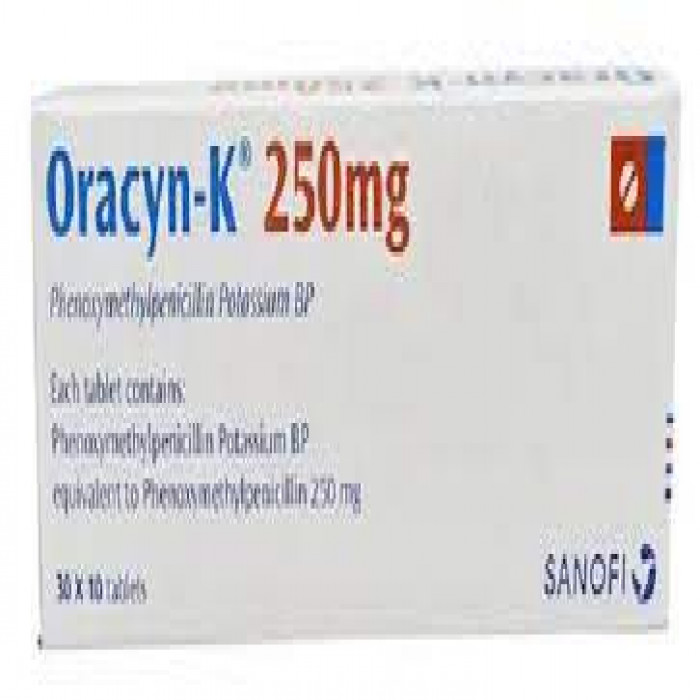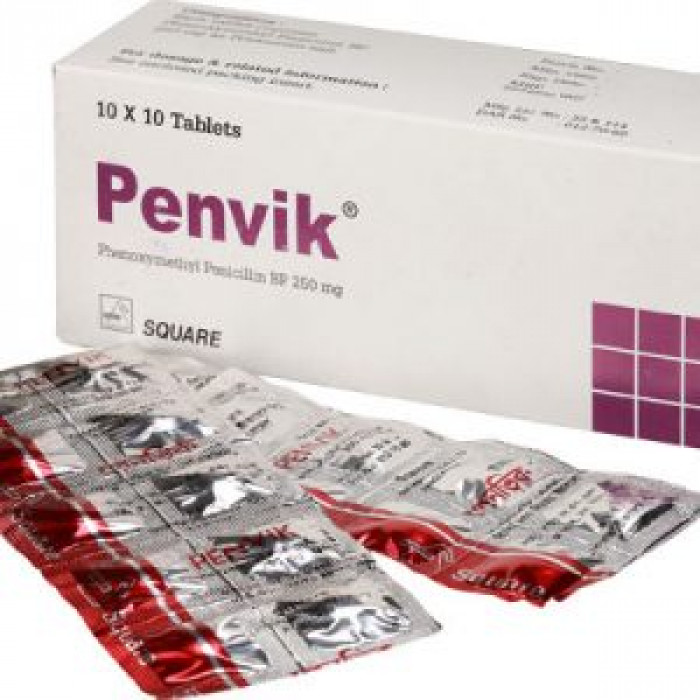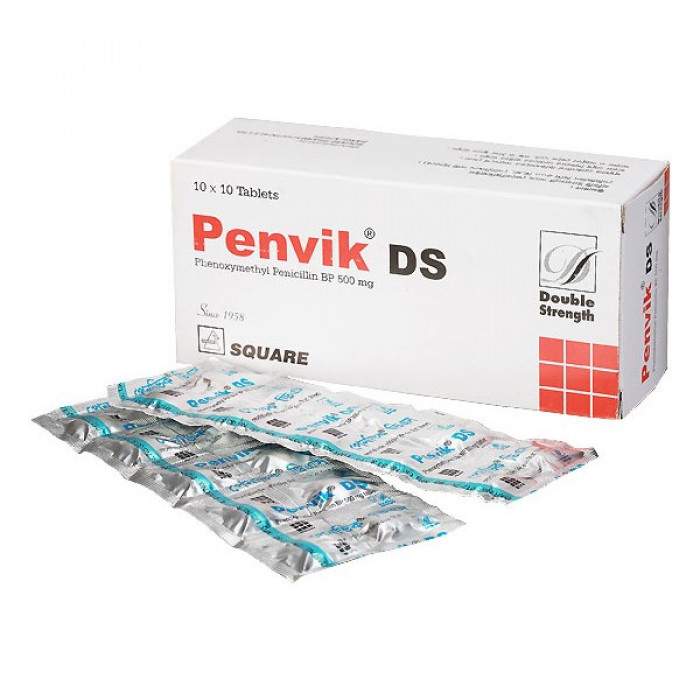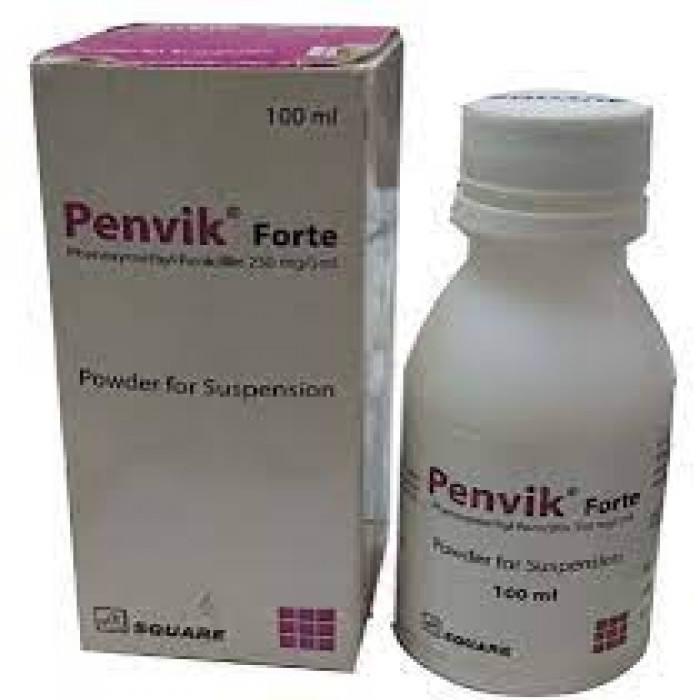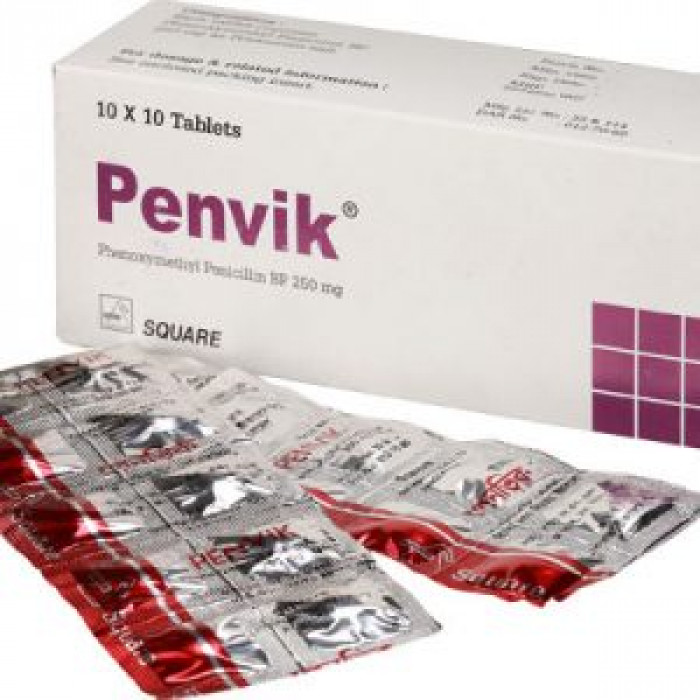
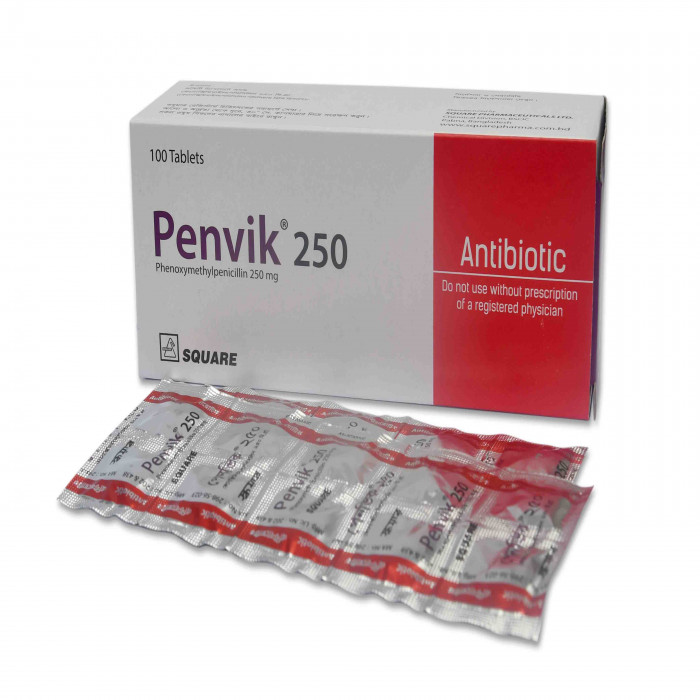
✔ 100% Authentic Product
👁️ Currently Viewing 5411
Penvik 250mg Tablet
Penvik 250mg Tablet is an antibiotic used to treat bacterial infections affecting the skin, throat, ears, nose, teeth, and lungs. It is effective against various types of bacteria and can also be used to prevent infections in certain conditions, such as sickle cell disease, chorea, rheumatic fever, or following spleen removal. Bacterial infections occur when harmful bacteria enter the body, multiply rapidly, and cause illness. This antibiotic specifically targets bacterial infections and does not work against viral infections like the flu or common cold.
Discount
Price: ৳ 27
MRP:
৳
28
5%
Off

100% Genuine Products, Guaranteed

Safe & Secure Payments, Always

Fast, Secure & Efficient Delivery

Proper Packaging
 Cash on Delivery - All over Bangladesh
Cash on Delivery - All over Bangladesh Regular Delivery - 12-24 Hours, Dhaka City* Charge Tk.39-59
Regular Delivery - 12-24 Hours, Dhaka City* Charge Tk.39-59 Regular Delivery - 24-48 Hours, Other Cities* Charge Tk.99-110
Regular Delivery - 24-48 Hours, Other Cities* Charge Tk.99-110
 ফ্রি ডেলিভারিঃ - ৯৯৯ টাকা+ অর্ডারে, ঢাকা
শহরে
ফ্রি ডেলিভারিঃ - ৯৯৯ টাকা+ অর্ডারে, ঢাকা
শহরে ফ্রি ডেলিভারিঃ - ২৯৯৯ টাকা+ অর্ডারে, ঢাকার
বাহিরে
ফ্রি ডেলিভারিঃ - ২৯৯৯ টাকা+ অর্ডারে, ঢাকার
বাহিরে
100% Genuine Products, Guaranteed
Safe & Secure Payments, Always
Fast, Secure & Efficient Delivery
Proper Packaging
 Cash on Delivery - All over Bangladesh
Cash on Delivery - All over Bangladesh Regular Delivery - 12-24 Hours, Dhaka City* Charge Tk.39-59
Regular Delivery - 12-24 Hours, Dhaka City* Charge Tk.39-59 Regular Delivery - 24-48 Hours, Other Cities* Charge Tk.99-110
Regular Delivery - 24-48 Hours, Other Cities* Charge Tk.99-110 ফ্রি ডেলিভারিঃ - ৯৯৯ টাকা+ অর্ডারে, ঢাকা
শহরে
ফ্রি ডেলিভারিঃ - ৯৯৯ টাকা+ অর্ডারে, ঢাকা
শহরে ফ্রি ডেলিভারিঃ - ২৯৯৯ টাকা+ অর্ডারে, ঢাকার
বাহিরে
ফ্রি ডেলিভারিঃ - ২৯৯৯ টাকা+ অর্ডারে, ঢাকার
বাহিরে
✅ Description:
Phenoxymethyl Penicillin is an antibiotic used to treat a range of bacterial infections affecting various parts of the body, including the skin, throat, ears, nose, teeth, and lungs. It can also serve as a preventive measure in specific medical conditions such as sickle cell disease, chorea, rheumatic fever, and post-splenectomy situations. Bacterial infections occur when harmful bacteria invade the body, multiply rapidly, and cause illness. Phenoxymethyl Penicillin selectively targets bacterial infections and is not effective against viral infections like the flu or common cold.
The active component in Phenoxymethyl Penicillin, Phenoxymethylpenicillin, belongs to the penicillin class of antibiotics. Its mode of action involves inhibiting the production of cell wall mucopeptides by binding to particular penicillin-binding proteins (PBPs) within the bacterial cell wall. This mechanism results in the destruction of bacteria and prevents the infection from spreading further.
Phenoxymethyl Penicillin should not be used if you have a known allergy to it or other penicillin antibiotics. It is crucial to inform your doctor of any kidney or liver conditions. While this medication is generally considered safe for use during pregnancy and breastfeeding, it is essential to notify your healthcare provider if you are pregnant or nursing before commencing Phenoxymethyl Penicillin. Disclosing your complete medical history and providing information about any ongoing medications is vital to avoid potential interactions and adverse effects.
Safety Advices

Alcohol
CONSULT YOUR DOCTOR
No interactions were found. However, if you have concerns, consult your doctor.

Pregnancy
CONSULT YOUR DOCTOR
Taking Penvik 250mg Tablet during pregnancy is considered safe if prescribed. However, it's important to inform your doctor if you are pregnant before using this medicine.

Breastfeeding
CONSULT YOUR DOCTOR
It is generally safe to take Penvik 250mg Tablet while breastfeeding if prescribed. Nevertheless, it's essential to consult your doctor before using this medicine if you are breastfeeding.

Driving
CAUTION
Be cautious when using Penvik 250mg Tablet, as it may cause dizziness and affect your ability to drive or operate machinery. It is advisable to avoid driving or operating machinery after taking this medication.

Kidney
CONSULT YOUR DOCTOR
Patients with a history of kidney disease should exercise caution when taking Penvik 250mg Tablet. Your doctor may need to adjust the dose or prescribe a suitable alternative based on your kidney condition.

Liver
CONSULT YOUR DOCTOR
If you have pre-existing liver disease or a history of liver issues, it is crucial to inform your doctor before using Penvik 250mg Tablet.
✔️ Uses of Penvik 250mg Tablet
Bacterial Infections
✔️ How does Penvik 250mg Tablet work?
PHENOXYMETHYLPENICILLIN functions by impeding the synthesis of bacterial cell walls, a process vital for bacterial survival. This action results in the destruction of bacteria and hinders the further development of the bacterial infection. PHENOXYMETHYLPENICILLIN is effective against a wide range of bacterial types and can also serve as a preventive measure for conditions like sickle cell disease, rheumatic fever, and certain movement disorders.
✔️ Side Effects of
- Nausea
- Vomiting
- Stomach pain
- Diarrhea
- Headache
✔️ Quick Suggestions:
- Incorporate fiber-enriched foods into your diet as they can be easily digested by your gut bacteria, promoting their growth.
- Consider adding fiber-rich foods to help restore healthy gut bacteria after a course of antibiotics.
- Limit the consumption of calcium or iron-enriched foods, as excessive intake might impact the functioning of PHENOXYMETHYLPENICILLIN.
- Follow the prescribed course of Penvik 250 diligently, even if your symptoms improve. Discontinuing treatment early can lead to a recurrence of the infection that may be more challenging to treat.
- If diarrhea occurs as a side effect, it should resolve once you complete your course. Contact your doctor if it persists or if you notice blood in your stools.
- Notify your doctor immediately if you experience symptoms like an itchy rash, facial, throat, or tongue swelling, or breathing difficulties while taking this medication.
- Stay adequately hydrated by increasing your fluid intake.
- To facilitate a swift recovery, avoid consuming alcohol and refrain from smoking.
✔️ Bacterial Infection
A bacterial infection is characterized by the intrusion of harmful bacteria into the body, where they quickly multiply and cause infection. Such infections can affect various parts of the body, ranging from minor illnesses to severe conditions like meningitis and encephalitis, which impact the brain. Common symptoms of bacterial infections include fever, chills, and fatigue. Individuals with weakened immune systems are particularly susceptible to infections. It's important to note that PHENOXYMETHYLPENICILLIN is effective against bacterial infections but does not work against viral infections, such as the common cold and flu.
✔️ Pharmacology
The active ingredient in Phenoxymethyl Penicillin is Phenoxymethylpenicillin, which belongs to the penicillin class of antibiotics. It works by inhibiting the production of cell wall mucopeptides through binding to specific penicillin-binding proteins (PBPs) within the bacterial cell wall. This action kills bacteria and prevents the further growth of the infection.
✔️ Dosage & Administration of Penvik 250mg Tablet
The required dosage of phenoxymethylpenicillin depends on your age, the severity of the infection, and whether you are using it for treatment or prevention.
Phenoxymethylpenicillin is available in two forms: 250mg tablets and liquid. The liquid form comes in two strengths: 125mg/5ml and 250mg/5ml, and both strengths can be found in a sugar-free version.
For adults and children aged 12 and over:
- To treat infections: Take 500mg four times a day.
- To prevent infections: Take 500mg twice a day.
The appropriate dosage for children under 12 varies depending on their age and weight:
- Children aged 1 month to 11 months should take 62.5mg four times a day.
- Children aged 1 to 5 years should take 125mg four times a day.
- Children aged 6 to 11 years should take 250mg four times a day.
When taking it twice a day, ensure there is a 12-hour gap between doses. For example, you can take it at 8 am and 8 pm.
It's best not to take phenoxymethylpenicillin with meals, as food may interfere with its effectiveness. Instead, take it 30 minutes before a meal or at least 2 hours after eating.
When taking phenoxymethylpenicillin tablets, swallow them whole without chewing or breaking.
If you or your child are using the liquid form, your pharmacist will prepare it for you. The medication will come with a plastic syringe or spoon to help you measure the correct dose. Avoid using a regular kitchen teaspoon, as it may not provide an accurate measurement. If you don't have a suitable measuring tool, ask your pharmacist for one.
✔️ Interaction
Drug-Drug Interactions: Phenoxymethyl Penicillin can interact with various medications. These include diuretics like furosemide, drugs from the cephalosporin class (such as cefaclor, cefadroxil, cefixime, cefpodoxime), other antibiotics, warfarin, and typhoid or cholera vaccines.
Drug-Food Interactions: It's advisable to avoid alcohol consumption and smoking while taking Phenoxymethyl Penicillin.
Drug-Disease Interactions: If you have kidney problems or liver problems, it's crucial to inform your doctor before starting Phenoxymethyl Penicillin to ensure the appropriate use and dosage of the medication.
✔️ Contraindications
Hypersensitivity to penicillins.
✔️ Pregnancy & Lactation
There are no adequate and well-controlled studies on the use of Phenoxymethyl Penicillin in pregnant women. There are no adequate and well-controlled studies on the use of Phenoxymethyl Penicillin in breastfeeding mothers.
✔️ Precautions & Warnings
Phenoxymethyl Penicillin is not suitable for individuals with known allergies to it or other penicillin antibiotics. It's essential to communicate any kidney or liver issues to your doctor before starting this medication. While Phenoxymethyl Penicillin is generally considered safe for use during pregnancy and breastfeeding, it's advisable to inform your healthcare provider if you are pregnant or nursing before taking it. Providing a comprehensive medical history and listing your current medications is crucial to avoid potential adverse reactions. Additionally, it's recommended to refrain from alcohol consumption during treatment to prevent unwanted side effects.
✔️ Storage Conditions
Store below 30°C temperature & in a dry place, protected from light. Keep all medicines out of reach of children.
⚠️Disclaimer:
At ePharma, we’re committed to providing accurate and accessible health information. However, all content is intended for informational purposes only and should not replace medical advice from a qualified physician. Please consult your healthcare provider for personalized guidance. We aim to support, not substitute, the doctor-patient relationship.




